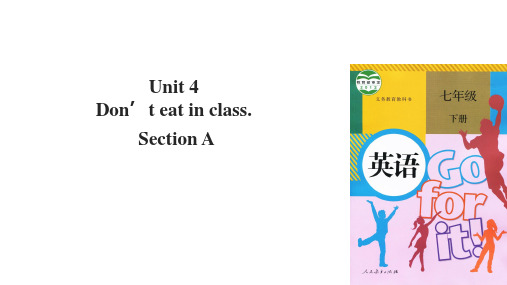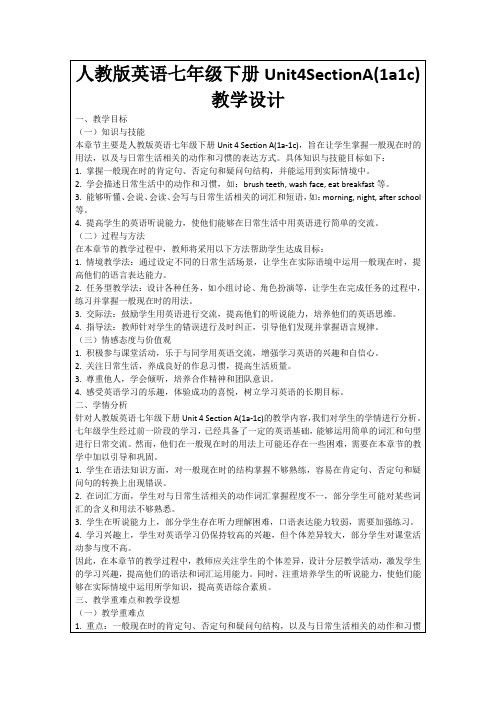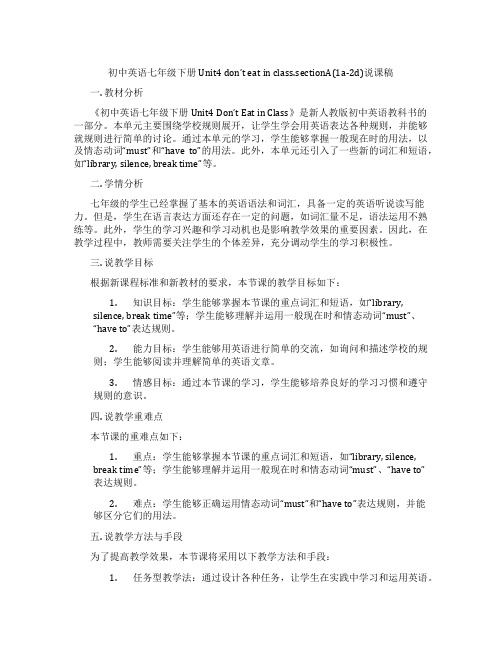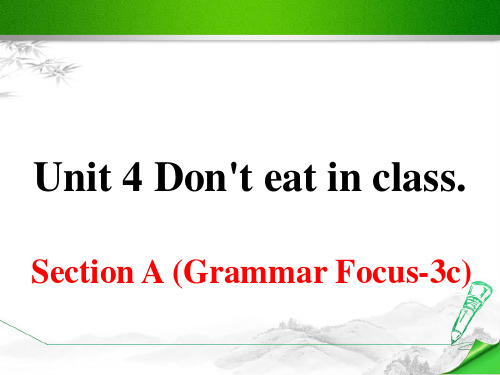人教版 初一 英语 下册 第四单元Section A
【人教版】初一七年级英语下册《Unit 4 Section A 第二课时》课件

A: Y__es_,_s_h_e_d__o_es_.
2. Eat? Q:D__o_e_s _h_e_h_a_v_e__to__e_a_t_i_n_t_h_e_d_i_n_i_n_g_h_a_ll?
No. The rule:_W__e_m_u_s_t_b_e_q_u_i_e_t._
Does she have to wear a school uniform? Yes. She has to wear school uniform.
The We have to wear school uniforms. rule:__________________________________
Ask questions as many as possible.(尽可能多地问问题)
_D_o_e_s John have to…?
Can John…?
3c Make up five cool rules for your dream school. Share your rules with the class. Your classmates vote for the Coolest School!
A: So, don’t eat in the classrooms.
dining hall
A: Can we listen to music in the
classrooms? B: No, we can’t. We can’t listen to music
in the classrooms. But we can listen to it
人教版新目标七年级下册英语课件:Unit 4 Section A

人民教育出版社 七年级 | 下册
人民教育出版社 七年级 | 下册
School Rules 1.Don’t arrive late for class. 2.Don’t run in the hallways. 3.Don’t eat in the classrooms. 4.Don’t listen to music in the classrooms or the hallways. 5.Don’t fight.
人民教育出版社 七年级 | 下册
What does the sign mean? You can’t park cars here! Don’t park cars here! No parking!
What does the sign mean? You can’t spit here! Don’t spit here!
What are the rules ?
We can’t listen to music in the classroom. Don’t listen to music in the classroom. We can’t fight. Don’t fight.
Let’s practice in pairs
be on time. 2. Don’t run in the
hallways. 3. Don’t eat in the
classroom. You must
eat in the dining hall. 4. Don’t listen to music
in the classrooms
or the hallways. 5. Don’t fight.
人民教育出版社 七年级 | 下册
人教新目标七年级英语下册Unit 4 Section A (1a~2d)课件

can can can
can’t can’t can’t
can
can’t
2b Listen again. Can Alan and Cindy do these activities? Circle can or can’t above.
Activity
√ eat 5. ___
in the dining hall 6. ___ eat outside 7. ___ √ wear a hat 8. ___ √ fight
2d
Role-play the conversation.
John: Hi, my name’s John. It’s my first day at school. Alice: Hi, John. I’m Alice. This is a great school, but there are a lot of rules. John: Really? What are some of the rules? Alice: Well, don’t be late for class. This is very important.
Unit 4 Don't eat in class.
Section A (1a-2d)
咱们来谈谈校规吧
Read and learn
Words and sentences
hallway
run in the hallways We can’t run in the hallways. Don’t run in the hallways.
We must be on time (for school).
dining hall
We can eat in the dining hall.
人教版英语七年级下册Unit4SectionA(1a1c)教学设计

1.学生在语法知识方面,对一般现在时的结构掌握不够熟练,容易在肯定句、否定句和疑问句的转换上出现错误。
2.在词汇方面,学生对与日常生活相关的动作词汇掌握程度不一,部分学生可能对某些词汇的含义和用法不够熟悉。
3.学生在听说能力上,部分学生存在听力理解困难,口语表达能力较弱,需要加强练习。
4.学习兴趣上,学生对英语学习仍保持较高的兴趣,但个体差异较大,部分学生对课堂活动参与度不高。
人教版英语七年级下册Unit4SectionA(1a1c)教学设计
一、教学目标
(一)知识与技能
本章节主要是人教版英语七年级下册Unit 4 Section A(1a-1c),旨在让学生掌握一般现在时的用法,以及与日常生活相关的动作和习惯的表达方式。具体知识与技能目标如下:
1.掌握一般现在时的肯定句、否定句和疑问句结构,并能运用到实际情境中。
(三)学生小组讨论
1.教师将学生分成若干小组,每组选择一个话题,如:早晨、中午、晚上或周末的日常活动。
2.各小组用一般现在时讨论话题,每位同学都要参与讨论,记录下组员的日常习惯。
3.讨论结束后,各小组派一名代表汇报讨论成果,其他同学认真倾听,互相学习。
(四)课堂练习
1.教师发放练习题,包括一般现在时的肯定句、否定句和疑问句转换,以及与日常生活相关的动作词汇填空。
2.学会描述日常生活中的动作和习惯,如:brush teeth, wash face, eat breakfast等。
3.能够听懂、会说、会读、会写与日常生活相关的词汇和短语,如:morning, night, after school等。
4.提高学生的英语听说能力,使他们能够在日常生活中用英语进行简单的交流。
初中英语七年级下册Unit4don'teatinclass.sectionA(1a-2d)说课稿

初中英语七年级下册Unit4 don’t eat in class.sectionA(1a-2d)说课稿一. 教材分析《初中英语七年级下册Unit4 Don’t Eat in Class》是新人教版初中英语教科书的一部分。
本单元主要围绕学校规则展开,让学生学会用英语表达各种规则,并能够就规则进行简单的讨论。
通过本单元的学习,学生能够掌握一般现在时的用法,以及情态动词“must”和“have to”的用法。
此外,本单元还引入了一些新的词汇和短语,如“library, silence, break time”等。
二. 学情分析七年级的学生已经掌握了基本的英语语法和词汇,具备一定的英语听说读写能力。
但是,学生在语言表达方面还存在一定的问题,如词汇量不足,语法运用不熟练等。
此外,学生的学习兴趣和学习动机也是影响教学效果的重要因素。
因此,在教学过程中,教师需要关注学生的个体差异,充分调动学生的学习积极性。
三. 说教学目标根据新课程标准和新教材的要求,本节课的教学目标如下:1.知识目标:学生能够掌握本节课的重点词汇和短语,如“library,silenc e, break time”等;学生能够理解并运用一般现在时和情态动词“must”、“have to”表达规则。
2.能力目标:学生能够用英语进行简单的交流,如询问和描述学校的规则;学生能够阅读并理解简单的英语文章。
3.情感目标:通过本节课的学习,学生能够培养良好的学习习惯和遵守规则的意识。
四. 说教学重难点本节课的重难点如下:1.重点:学生能够掌握本节课的重点词汇和短语,如“library, silence,break time”等;学生能够理解并运用一般现在时和情态动词“must”、“have to”表达规则。
2.难点:学生能够正确运用情态动词“must”和“have to”表达规则,并能够区分它们的用法。
五. 说教学方法与手段为了提高教学效果,本节课将采用以下教学方法和手段:1.任务型教学法:通过设计各种任务,让学生在实践中学习和运用英语。
【人教版】初一七年级英语下册《Unit 4 Section A 第二课时》课件

A: Can we arrive late for class?
B: No, we can't. We can’t arrive late for class.
A: So, don’t arrive late for class.
arrive late for class = be late for class
(we/ can/ in the hallways)? A: _N_o_,_w_e_c_a_n_’_t_.___
4. Wear a hat? Q:_C_a_n__w_e_w__e_a_r_a__h_a_t _in__t_h_e_c_l_a_ss_r_o_o_m__? (we/ can/ in the classroom)? A: _N_o_,_w_e__c_a_n_’t_.____
Can we fight? We can’t fight. The rule:___D_o_n_’_t _fi_g_h_t.____
Can we be late for class? No. The rule:_W_e__m__u_st__b_e_o_n__ti_m__e._
Can we talk loudly(大声地) in class?
No. The rule:_W__e_m_u_s_t_b_e_q_u_i_e_t._
Does she have to wear a school uniform? Yes. She has to wear school uniform.
The We have to wear school uniforms. rule:__________________________________
Unit+4++Section+A+1a-3c 人教版英语七年级下册
We can’t listen to music in the hallways, but we can listen to it outside.
2d Role-play the conversation.
Read the conversation and complete the sentences. 1.John’s new school has _a_l_o_t_o_f_r_u_l_e_s_ . 2.It’s important _t_o_b_e__o_n_t_im__e___ . 3.John can’t __b__ri_n_g___ music players to __s_c_h_o_o_l ___. 4.John_a_l_w_a_y_s__wears uniforms to school and _is__q_u_it_e__
1c Student A is a new student. Student B
tells Student A about the rules above.
What are the rules?
Hale Waihona Puke Well, we can’t arrive late for class. We must
be on time.
3. _√__ listen to music outside 4. _√__ eat in the classroom
5. _√__ eat in the dining hall 6. ___ eat outside
7. _√__ wear a hat
8. _√__ fight
2b Listen again. Can Alan and Cindy do these
人教版初中英语七年级下册Unit4SectionA教材全解
人教版初中英语七年级下册Unit4SectionA教材全解Unit 4 Don’teat in class.Unit 4 Section A教材全解1.Don’tarrive late for class上.课不要迟到。
【重点注释】①这句是祈使句的否定形式( Don’ t +行为动词原形 +其他),用于表达命令、请求等。
祈使句可以表达说话人的意愿、请求、叮嘱、号召、命令或建议,它的主语(听话人)通常省略,谓语动词用原形,句子末尾用感叹号或句号。
例如: Don’t throw the ball like that.不要那样扔球。
② arrive late for 与 be late for 同义,都表示“做某事迟到”。
arrive late for 侧重到达的时间晚, be late for 侧重状态。
例如: Don’t arrive late for the meeting nexttime.=Don’t be late for the meeting next time下.次开会别迟到了。
③arrive 不及物动词,意为“到达,抵达,来到” ,不能直接跟名词作宾语,但可以接介词 at 或 in,构成短语“ arrive at/in+地点( at+小地方 ,arrive at the bus stop;in+大地方 ,arrive in Beijing )”,意为“到达⋯⋯”;arrive 后若是 here,there,home 等地点副词,则不需要加in 或at 等介词(arrive here/there/home)。
例如:He arrives at the bus stop at 8 ’o clock every morning.他每天早晨 8 点到达公共汽车站。
When did you arrive in Beijing? 你什么时候到北京的? I arrive home at 4:00 in the afternoon.我下午 4 点钟到家。
人教版七年级英语下册教学课件《Unit 4 Section A Grammar Focus-3c》
3a Write the rules for the school library.
Library Rules 1. Don’t talk. 2. Don’t eat. 3.Don’t listen to music. 4. Don’t take photos.
Use the words to make questions about 3b the rules. Then write answers according
8. 他在学校里必须穿校服吗? _D_o_e_s__h_e__h_a_v_e__t_o__w__e_a_r__a__u_n_if_o_r_m___a_t__s_c_h_o_o_l?
9. 是的,必须。/ 不,不必。 _Y__e_s_,__h_e__d_o_e_s_.__/__N_o_,__h_e__d_o_e_s_n_’_t_._
We can eat in class. …
We don’t have to wear school uniforms. …
We can listen to music in class. …
We can eat in the classroom. …
We don’t have to do homework. …
(he/have to/in the dining hall)?
A: __Y_e_s_,_h_e__d_o_e_s_._____
Listen to music?
Q: _C_a_n__w__e_l_i_s_te_n__t_o__m__u_s_ic__i_n_t_h_e__h_a_l_l_w_a_y__s? ______________________________________________________ (we/can/in the hallways)?
人教版七年级下册英语课件Unit 4Section A 1 (1a-2d) (共34张PPT)
3. Don’t eat in the classroom. You must eat in the dining hall.
4. Don’t listen to music in class.
5. Don’t fight.
5 Don’t fight.
Listen. What rules are these
1b students breaking? Write the
numbers after the names.
Peter _2_._D__o_n_’t__ru__n_i_n_t_h_e_h__a_ll_w_a_y_s_.___ Amy _3_._D__o_n_’t__ea_t__in__th__e_c_la_s_s_r_o_o_m_.___ Mike _4_._D__o_n_’t__li_st_e_n__to__m_u__si_c_i_n_c_l_a_s_s._
Look at the table. There are eight activities. Read the phrases and guess what your classmates can do and what they can’t do?
Listen. Check (√) the activities
fight with classmates eat in the dining hall
Can we…? Why?
eat in the classroom
listen to music in class
wear slippers in tther
1. To learn to use Imperatives: Don’t…
- 1、下载文档前请自行甄别文档内容的完整性,平台不提供额外的编辑、内容补充、找答案等附加服务。
- 2、"仅部分预览"的文档,不可在线预览部分如存在完整性等问题,可反馈申请退款(可完整预览的文档不适用该条件!)。
- 3、如文档侵犯您的权益,请联系客服反馈,我们会尽快为您处理(人工客服工作时间:9:00-18:30)。
2) actor 男演员 actress 女演员。 男演员, 女演员。 一位演员要用an而不用 。 一位演员要用 而不用a。如: 而不用 He’s an actor. 他是一位演员。 他是一位演员。 waiter 男侍者 waitress 女侍者 男侍者,
2. report + er = reporter 记者 发出动作的人” “动词 + er = 发出动作的人”。这是一种 构词法。 构词法。如: teach 教书 教书—teacher教师 教师 run— runner write—writer 作家 work— worker 工人 有少数两个是加or。 有少数两个是加 。如: actor 演员 visitor 参观者
七年级人教新目标下册
Unit 4 I want to be an actor.
Section A
presidents
football players
scientists
singers
workers
students
dancer
officer
actor
actress
What does he do? Where does he work? He is a worker. He works in a factory.
She is a student. She studies in a school.
policewoman policeman police station
He is a cook. He works in a restaurant.
waiter
waitress
They work in a restaurant.
6. What does he do? 他是做什么的 他是做什么的?
what 对“职业”提问。如: 职业”提问。
He is a teacher. →What does he do? I am a doctor. →What do you do?
转换同义句。 转换同义句。
What does he do?= What is he? = What’s his job? 又如: 又如 What do you do? = What are you? = What’s your job?
He is a postman. He works in a post office. Postmen send letters and postcards to us.
What does they do?
What does they do?
1a. Match the words and the pictures.
4. NOW SHOWING 正在放映 5. in hospital 住院 in the /a hospital 在医院。 在医院。 他生病住院了。 如: He is ill in hospital. 他生病住院了。 His father works in a hospital. 他父亲在一家医院工作。 他父亲在一家医院工作。
(动词 动词buy, make, cook, get, draw, sing等常与 等常与for 动词 等常与 搭配;其余与 搭配) 其余与to搭配 搭配 其余与 搭配 请给我一点水。 如: Please give some water to me. 请给我一点水。 He sings an English song for us. 他给我们唱了一首英语歌。 他给我们唱了一首英语歌。
Job
bank clerk waiter student
Wants to be
policewoman actor doctor
2c. Pairwork
Ask and answer questions about the pictures in 2a.
What does she want to be? She wants to be a reporter.
7. money 钱,不可数名词。 不可数名词。 不可数名词 much money 许多钱 Hard money 硬币 paper money 纸币 make money 赚钱
I want to make more money. 我想赚更多的钱。 我想赚更多的钱。 Time is money. 时间就是金钱。 时间就是金钱。 Money is not everything. 金钱并非万能。 金钱并非万能。 Money makes the mare go. 有钱能使鬼推磨。 有钱能使鬼推磨。
What does he do? He is a policeman. Where does he work? He works in a Police Station.
Discuss in groups
My name is Yang Xiaochen. I’m a school boy. I’m not good at my school work. My parents are worried about me.They want me to get better marks (分数 in school and get a good 分数) 分数 job in future. But I only want to be a professional soccer ball player, because I’m good at soccer ball. My dear friends, what should I do? Please tell Yang Xiaochen what he should do. Is professional soccer ball player better for boys or girls?
4. Guess the job!
a reporter
a nurse
a police officer
a student
a farmer
a waiter
Summary
询问职业: 询问职业: What do you do? I’m a reporter. What does he do? He’s a student. 想要成为…… 想要成为…… What do you want to be? I want to be an actor. What does he want to be? He wants to be a bank clerk.
What does he want to be? He wants to be a basketball player.
3a. Match the jobs with the people.
1.waiter 2. nurse 3. bank clerk 4. policeman 5. reporter
8. People give me their money. 人们把钱交给我。 人们把钱交给我。 1) give sth to sb表示“把某物给某人”。 表示“ 表示 把某物给某人” 其中sth表某物 称直接宾语; 表某人 表某物, 表某人, 其中 表某物 称直接宾语;sb表某人 称间接 宾语。两者合称“双宾语” 常见结构为: 宾语。两者合称“双宾语”。常见结构为: 动词+直接宾语 直接宾语+to/for+间接宾语” 间接宾语” “动词 直接宾语 间接宾语
What does she do? What does she want to be? She wants to be a shop assistant. She’s a doctor.
Language Points
1. I want to be an actor. 我想成为一名演员。 我想成为一名演员。 1) “want to be + 职业”表示“想成为一名……” 职业”表示“想成为一名……” 如: I want to be a doctor. 我想成为一名医生。 我想成为一名医生。 He wants to be a teacher. 他想成为一名教师。 他想成为一名教师。 学过的有关want的用法还有:want sth; 的用法还有: 学过的有关 的用法还有 want to do sth; want sb to do sth.
1. shop f assistant ____ 2. doctor ____ b 3. actor _____ h 4. reporter ____ C a 5. policeman ____ d 6. waiter ____ e 7. bank clerk ____ g 8. student ____
What does she do? She is a bank clerk. Where does she work? She works in a bank.
What does she do? She is a reporter. Where does she work? She works in a TV station.
Hale Waihona Puke 3 52 43b. Pairwork What does she do? She is a doctor. Where does she work? She works in a hospital.
What does he do? He is a waiter. Where does he work? He works in a restaurant.
He is a doctor.
He works in a hospital.
A doctor looks over the patients.
She is a nurse. She wears a white uniform. She works in a hospital.
A nurse helps doctors look after patients.
